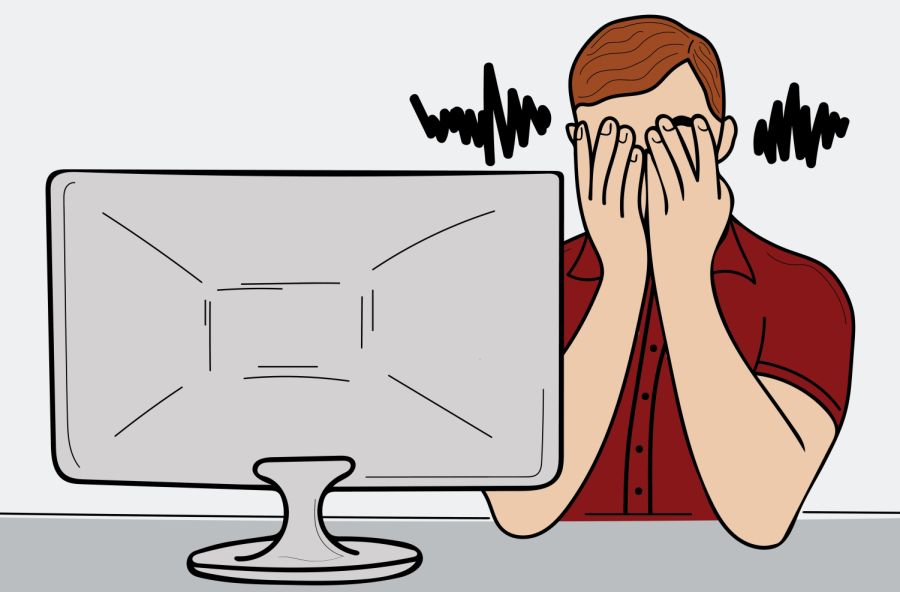April is stress awareness month, and seniors at the University of Minnesota are experiencing high stress levels during the seven-week stretch of continuous classes between spring break and graduation.
According to a study from the American College Health Association, almost half of college students reported moderate or severe psychological stress, influenced by social media use and the coming out of the COVID-19 pandemic.
Sid Iyer, a fourth-year student graduating this spring, is one of the many students feeling this trend personally, largely due to securing a post-graduation job while still attending classes.
“Finding jobs is definitely the most stressful part of senior year,” Iyer said. “I have a job lined up, but it took a while — that process is really difficult.”
Morgan Michalkiewicz, a fourth-year student, said many factors make this time of year overwhelming for her. She is planning to apply for public health master’s programs following graduation.
“I’m motivated solely because I want to get into graduate school, and I can’t let my grades slip,” Michalkiewicz said.
Though serving as a point of motivation for many, post-graduation plans add additional stress for many seniors.
Marie Romell is a fourth-year student planning to continue her education at the University to earn a master’s in data science for chemical engineering following graduation this spring. Although her school plans aligned for the coming fall, she said she has plenty of other stressors piling up.
“I got into grad school, but now I have to worry about summer jobs and where I’m going to live next year,” Romell said. “I put that all off until now, and I feel like I’m running against the clock.”
A lack of motivation in the final stretch
On top of this stress, students must also keep up with their coursework to be able to graduate, which some students said is difficult to do in the final stretch.
“Motivation levels are lower now than a year ago, just because graduation is so close,” Iyer said. “I don’t want to do badly in my last semester here, so that motivates me more than anything else.”
However, other students find graduation to serve as a point of motivation for them.
“I’m excited to graduate and that’s why I’m not going to mess that up in my last semester,” Romell said.
Spring semester in Minnesota is often accompanied by unpredictable weather conditions that some students said can hinder their motivation. Seasonal mood disorders are common and can affect personal well-being, according to the University of Minnesota Physicians website.
“The changing of weather constantly — it’s either raining or snowing — doesn’t exactly give you the motivation to leave the house or go to class,” Michalkiewicz said.
University health coaches focus on healthy coping mechanisms and mindfulness
Students are increasingly seeking out resources to combat elevated stress levels, according to the American Institute of Stress.
The University offers multiple mental health resources for students, including Student Counseling Services, Boynton Health’s formal individual therapy, and Let’s Talk, which is informal drop-in counseling. Group therapy is not currently active through Boynton, but they plan to bring this back for students in the fall of this year.
Additional well-being resources are available through the Recreation and Wellness Center (RecWell).
Allee Peterson is currently working as the University’s RecWell health coach, in addition to pursuing her master’s in integrative health and wellbeing coaching. The University offers students five free health coaching sessions per semester.
Health coaches are focused on what is currently happening in the client’s life, whereas some types of therapy focus more on the past, according to Peterson. Health coaching also goes beyond talking and integrates creative activities to help the client achieve specific goals they set for themselves, Peterson said.
There is a lot of importance in having healthy stress coping mechanisms during this time of year involving movement, healthy eating, good sleep and structured morning routines setting students up for a successful day, according to Peterson. Individuals have different needs, and there is no “one-size fits all” approach to well-being.
“When stress levels are high, but motivation is low, I recommend slowing down,” Peterson said. “Find things you enjoy. When you’re trying to add something to your health routine that doesn’t feel natural, it’s probably not going to work … focus on what feels best for you.”
“Senioritis” is common, but there are things students can do to combat those motivation slumps, Peterson said.
“Find your bigger ‘why.’ What do you love most about being in college?” Peterson said. “I want to help paint the perspective that this chapter of your life is coming to a close to encourage mindfulness rather than future-tripping.”



















